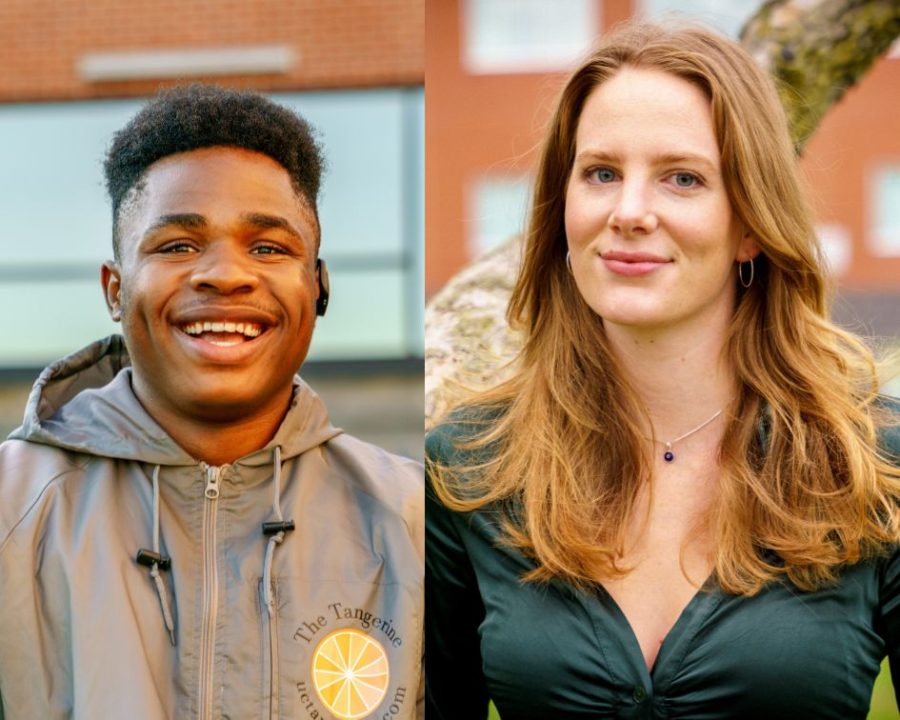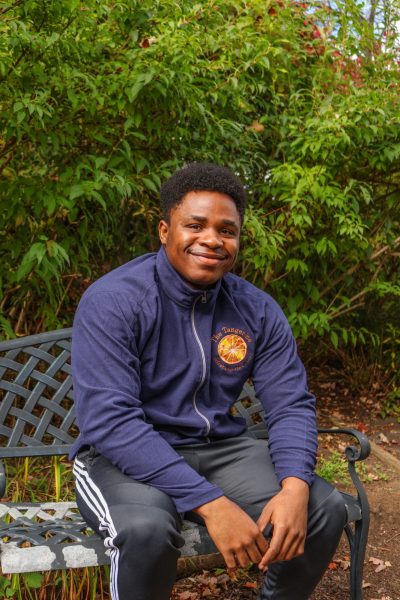POV: Being culturally different isn’t bad
Pictured are Mickale Thompson (left) and Hannah Steyn (right).
May 13, 2022
Mickale Thompson’s POV:
The task of adjusting to a new culture, new environment and a new way of life is challenging because it takes a lot of sacrifices.
Coming from a different country, I knew that the adjustment period would take some time due to the differences between American and Jamaican cultures. I knew that I had to embrace this transition and have an open mind to the new culture, which at times was challenging.
My brief stint in high school was interesting and came as a culture shock in many ways. The structure in which the school was built was different – students in the cafeteria seemingly sat in the same place with the same social group every day, and among all those social groups and spaces, I didn’t have a place.
The reactions from people when I mention that I’m from a different country often come as a surprise. The questions people ask when I tell them I am from Jamaica leave me befuddled. One of my favorites is, “how and when did you learn English?” Jamaica is an English-speaking country. I find it interesting that America is one of the most multicultural countries in the world, yet there is such a lack of knowledge and lack of awareness that comes from some Americans, and oftentimes the questions they ask are honestly shocking.
Cultural identity is important for all of us, but when we are talking about immigrants such as myself, our cultural identities are put to the test and altered because of the new surroundings we are introduced to. We all hear the term that immigrants are considered “outsiders.” Because of that, we must constantly adjust to others while they don’t have to adjust to us, and that is something people just don’t realize. The willingness of individuals who come from different countries to adjust and change their foundational cultural identities and personalities to engage and communicate socially with others is a skill and a daunting task. That period of adjusting will never end.
I have altered my cultural identity numerous times since coming to America. There are times when I’m engaged in conversations with others and they mention certain things such as television shows, activities, food and other things that I have no cultural connection to. Instead of explaining and sharing those experiences with me, the common reaction from them is “that’s weird” or “you’re weird.” It is something that I’ve become used to, and I try not to take offense to which, at times, is difficult. Because of the experiences I’ve had, I am willing to always share my cultural experiences and perspectives. I understand that they are unaware, however, I have not been granted that same opportunity and I’ve been met with judgment instead.
We all understand that there are different kinds of immigrants. Some come from across Europe, which are bigger countries, where I come from a small island. I am a third-world immigrant and that plays a huge role and is a crucial factor in how people perceive me, look at me and the questions they ask me. One wouldn’t think to ask someone who is originally from Spain “how did you get here?” or “did you come on a boat?” These social scenarios are what I have experienced and continue to experience.
While I have come across some amazing people who have embraced me and my culture, I find that ever so often these same microaggressions reveal themselves again which makes it difficult to socially navigate within this foreign cultural environment and difficult to fully embrace this new culture.
Over time, because of these experiences, I’ve become more aware that I need to keep my foundation intact, despite these comments. It’s reached a point where I rarely tell people where I’m from. When people ask me, I just tell them where I live.
But I am not hiding my cultural identity or where I’m from, I’m just protecting it because it has been judged so many times.
Hannah Steyn’s POV:
During my first two years in the U.S., I didn’t notice the stark differences between my own culture and that of the average American. I came here initially as an au pair, a live-in nanny, and as a result of my circumstances, the people I spent my time with were other au pairs. Girls from Mexico, Italy, England, Austria and other countries. While all our cultures had differences, the bones of them were much the same.
Enrolling in an American college was more of a culture shock than I ever could have anticipated. The questions I’ve received from Americans, the people who pride themselves on a top-notch education system, have left me speechless more than once. People compliment me on my English speaking skills, despite it being my native tongue. I’ve had people accuse me of lying about my nationality, and had people threaten me when I’ve told them I’m from South Africa because as a person with light skin, how could that possibly be the case? I’ve had people ask me how I got here, whether or not we have shopping malls and outright ask me whether I’m poor. I’ve even endured blatant raging anti-immigrant speeches from people I’d previously thought of as friends.
It’s taken some time to adjust to the culture I didn’t think would be that different from my own. I made the mistake of thinking there would be no differences, so I didn’t give myself the preparation that might have helped. Adjusting to a new culture comes with unexpected downsides – the vague guilt that you’re moving away from your own culture brings a weird identity crisis with it. Having to change the way I say words, including the way I pronounce my own name, so people can better understand me leads to my friends and family back home commenting on how I’m becoming American, and leaving the South African in me behind. As much as I can appreciate American culture, I don’t want to become American. Being here has made me appreciate the nuances of my own culture so much more. Observing and adjusting to an individualistic culture when coming from such a community based one is a fascinating experience, and while initially I judged harshly, I’m realizing more and more that the “norm” here is simply different. And different isn’t bad.
As an immigrant, you have to learn that quickly, and it’s an experience I wish everyone could have. Being judged for my cultural differences has been a huge theme of my time here, despite Utica University having such a diverse population. Being an immigrant in America can be a somewhat isolating experience – the way people interact and make friends is completely different to the way you’re accustomed to. It can be difficult to see attempts at conversations or interactions fail simply because the people you’re talking to see the way you act, the way you’ve always acted, as weird rather than seeing it as an opportunity to learn more about how different cultures interact. Individuals are not always appreciative of variances in cultures. But once you not only accept, but appreciate, those differences, it opens up a whole new world.


















![President Todd Pfannestiel poses with Jeremy Thurston chairperson Board of Trustees [left] and former chairperson Robert Brvenik [right] after accepting the university's institutional charter.](https://uticatangerine.com/wp-content/uploads/2023/10/unnamed.jpeg)





















































































































